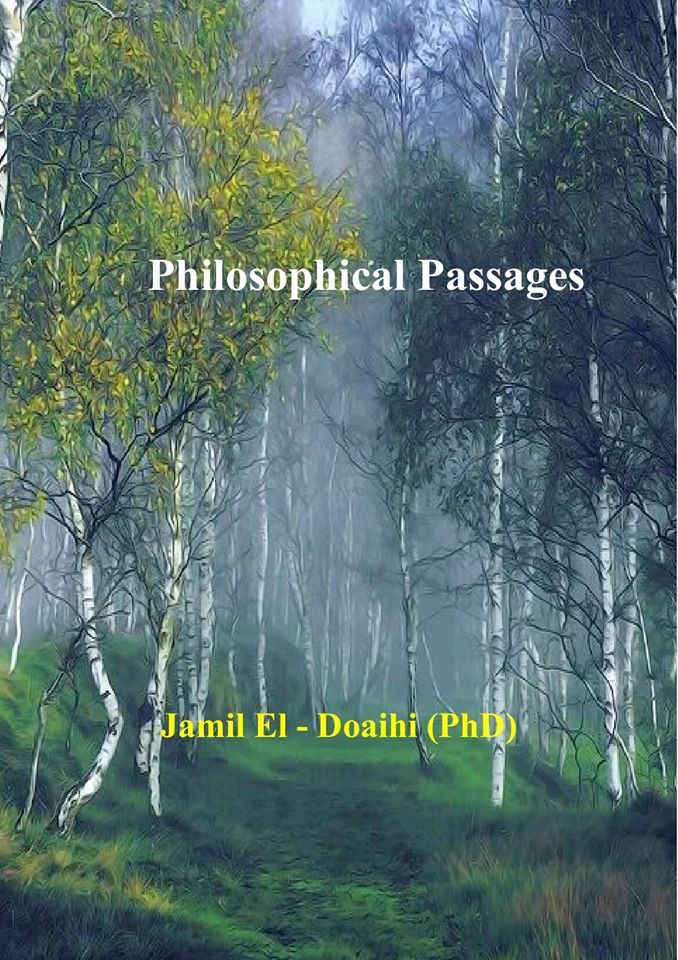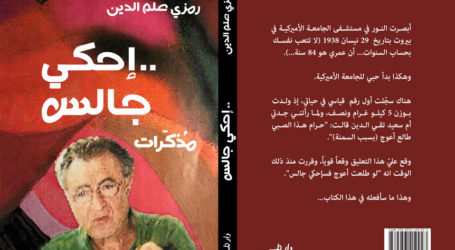“نصوص فلسفيّة” بالإنكليزية… جديد د. جميل الدويهي
يصدر في سيدني في 30 أيار المقبل، كتاب د. جميل الدويهي الجديد “نصوص فلسفيّة” باللغة الإنكليزيّة، وهو كتابه الخامس بهذه اللغة، وينضم إلى حوالي 44 كتاباً سبقته منذ عام 1990.
الكتاب سيقدَّم، مع مجموعة أخرى من الكتب من أعماله وأعمال الأديبة مريم رعيدي الدويهي، هدايا مجانية إلى الحضور في مهرجان الأدب الراقي 5 سيدني الذي سيعلن عنه لاحقاً. من الكتاب:
1- مؤمن وكافر
قال راهب متنسّك لراهب آخر أكبر منه سنّاً: لقد أتينا يا أخي إلى هذا القفر، لننجو بانفسنا من الخطيئة والشرّ… ففي هذه الغابات البعيدة التي لا يوجد فيها بشر، ننأى بأجسادنا وأرواحنا عن التجربة… لكنّني ما زلت أشعر بأنّ الخطيئة تلاحقني، وأعتقد أنّ هذه الشجرة العاتية التي تشمخ على كتف الوادي أكثر براءة وطهارة منّي، فهي لم تقع في تجربة، ولم يقرب منها الشرّير.
وفجأة مرّ في المكان تاجر من بلد بعيد. وعندما رأى الكاهنين خفّ إليهما، وسألهما عن الله.
قال الكاهن الأصغر: أحقّاً انت لم تهتدِ إلى الله… ولم تعرفه؟
قال التاجر: حقّا يا أخي… فقد ولدتُ في قبيلة يعبد أبناؤها القمر، ويسجدون للنجوم… وإنّني سمعت في بعض المدن أنّ الله موجود، ولذلك أسألكم عنه.
قال الكاهن الأكبر: ألم تصل إليكم الكتب فتقرأوها وتؤمنوا؟
أجاب التاجر: لا يا أبتِ الجليل، وإنّ الناس في قبيلتي لا يعرفون القراءة ولا الكتابة.
قال الكاهن الأصغر، وهو يرسم ابتسامة صفراء على شفتيه: إنّني أشفق على قومِك أيّها الرجل الغريب، وأحزن لأنّهم كافرون، ولم يصلوا إلى الحقيقة التي وصلنا نحن إليها.
ذهب التاجر حزيناً، واختفى بين الأشجار الكثيفة.
وعندئذٍ قال الكاهن الأكبر لرفيقه: الآن فقط عرفت كيف أنّ هذه الشجرة التي ترتفع فوق الوادي هي أكثر براءة وطهارة منك.
-The Believer and the Infidel
A hermetic monk said to an older fellow monk, “We have come to this wilderness, my brother, to save ourselves from sin and evil… In these distant forests where there are no other human beings, we distract our bodies and our souls from temptation, but I still feel that sin is chasing me, and I believe that this mighty tree that stands above the valley is more innocent than me.”
Suddenly, a merchant from a distant country passed by. When he saw the two monks, he rushed to .them and asked them about the existence of God
The younger monk asked the merchant, “Is it true that you have not found God and do not know Him؟”
The merchant answered, “Yes, it is true, my brother, for I was born in a tribe that worships the moon and glorifies the stars, but I have heard in some cities that God exists, and that is why I am here to find out more about Him.”
The older monk asked the merchant, “Did the holy books not reach you?”
The merchant replied, “No, Reverend Father. Even so, my people do not know how to read and write.”
As he painted a pale smile on his lips, the younger monk said, “I pity your people, strange man, and grieve for they are unbelievers, and they have not arrived at the truth that we have come to.”
The merchant left in sadness and walked through the thick forest.
The older monk said to the other, “I have just discovered why this tree that stands above the valley is more innocent than you.”
2- امرأتان
دخل جنود أعداء إلى قرية بعد حصار طويل، فانتقموا من سكانها، وقتلوا كثيرين منهم، وأحرقوا البيوت، وأتلفوا الزرع. وألقى نفر منهم القبض على امرأتين… فهدّدوا الأولى بالموت إذا لم ترض بالمذلّة، وتسلّم جسدها إليهم طائعة… ولمّا رفضت أطلقوا النار عليها، فخرّت صريعة… أمّا الثانية، فخافت على حياتها، وفضّلت المهانة على الموت. وقبل أن يغادر الجنود، أفرغ أحدهم الرصاص في جسدها، فسقطت جثّة بجانب أختها.
وإلى اليوم، ما زال في تلك القرية البعيدة قبران متجاوران، واحد مكتوب عليه: هنا ترقد امرأة ماتت من الخوف، والآخر مكتوب عليه: هنا تحيا امرأة ولدت من الشجاعة.
2- Two Women
The enemy soldiers entered a village after a long siege and took revenge on its inhabitants, killing many of them, burning houses, and destroying crops. A group of them captured two women and threatened one of them with death if she would not accept humiliation and offer them her body obediently. When she refused, they opened fire and killed her.
The second woman feared for her life and accepted humiliation in the hopes of saving her life. Before the soldiers left, one of them shot her, and her corpse fell next to her sister’s.
To this day, there are still two adjacent graves in that remote village; on one of them is written: Here lies a woman who died of fear, and on the other is written: Here lives a woman who was born from bravery.
3- الغراب
كان أناسٌ في قرية وراء الجبال يعبدون غراباً أسود، وقد حنّطوه وجعلوا له مقاماً في وسط القرية، يزورونه ويتباركون به. فالرجال كانوا يسجدون أمامه ويبتهلون إليه بأن يغدق عليهم بالخير وعلى أراضيهم بالغلال، والنساء كنّ يصلّين بتضرّع لكي يشفق الإله الغراب عليهنّ، فينجبنَ أطفالاً يشبهونه في وسامته وجلاله. والأولاد الصغار كانوا يطلبون منه أن يكون لهم في كلّ يوم عطلة وعِيد لكي لا يذهبوا إلى مدارسهم.
وكانت تسهر على ذلك الغراب سادنة عجوز، تتقن السحر والشعوذة.
وذات ليلة مرضت السادنة فلزمت بيتها، ولم تحرس الغراب المحنّط، فمرّ في المكان رجل غريب، ورأى الطائر الأسود، فانزعج من هيئته، وانتزعه من مكانه، ثمّ جاء بحمامة ناصعة البياض وجعلها في الموقع، حتّى جاء الصباح، وخرج الناس من بيوتهم. وكان أوّل ما فعلوه أن ذهبوا ليلقوا نظرة على غرابهم، فلم يجدوه، بل وجدوا الحمامة تقف مكانه وتهدل بصوت عذب. فما كان منهم إلاّ أن هجموا على الحمامة وأمسكوا بها، فنتفوا ريشها، وقطّعوها إرباً إرباً، ورموا بها في بئر عميقة، وقالوا بعضهم لبعض: لقد استقامت العدالة، وتخلّصنا من الشرّ الذي أحاط بنا من غير أن ندري، وليس علينا الآن سوى أن نبحث عن غرابنا الحبيب، أو نجد أيّ غراب من طينته، فيعود النور إلى قلوبنا، ويزول الشؤم الذي جاءت به هذه الحمامة إلى قريتنا، ويُمحى يوم أسود من تاريخنا المجيد.
3-The Crow
People in a village situated behind the mountains worshiped a black crow. They mummified it and made a shrine for it in the middle of the village. They visited and blessed it. The men prostrated and prayed to it to bestow them with abundance and fill their lands with grains, and the women begged it to have pity on them so that they would have children who resemble it in its beauty and majesty. The little boys asked of it that every day they’d have a holiday and not go to school.
An old priestess, who practiced witchcraft and sorcery, was appointed to guard the crow.
One night, the priestess fell ill and stayed home. She did not guard the embalmed crow. A strange man passed through the village, saw the black bird, and became disturbed by its appearance. He removed the crow and replaced it with a dove.
The next morning, the villagers went out. The first thing they did was go out to have a look at their crow. They were stunned when they did not find the black bird, but rather, they found the dove standing in its place and singing in a sweet voice. The villagers attacked the dove and caught it, plucked its feathers, cut it into pieces, and threw it in a deep well. They said to each other, “Justice has been done, and we have been freed from the evil that surrounded us. Now we only have to look for our beloved crow or find any similar crow so that the light returns to our hearts and the misfortune that this dove brought to our village is wiped out, and a black day vanishes from our glorious history
***
(*) مشروع الأديب د. جميل الدويهي “أفكار اغترابيّة” للأدب الراقي – سيدني 2020








